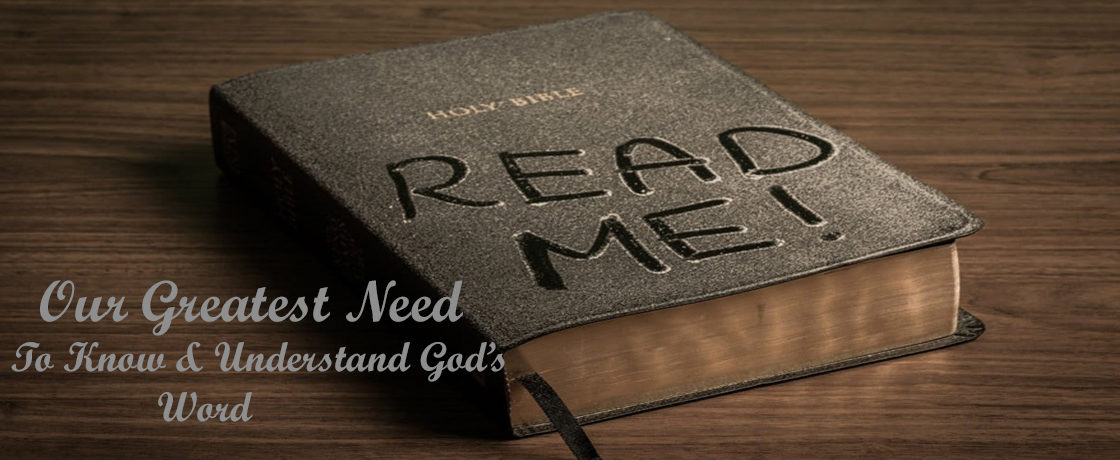Our Greatest Need To Know & Understand God’s Word
Our Greatest Need
To Know & Understand God’s Word
The most burning need of all time, and this moment, is to think God’s thoughts after Him; to study Scripture, so that we might turn to and know the God of our creation and our redemption and the Son whom He sent to provide our redemption; and also the Spirit whom He has poured out so that we can be empowered and transformed now, and prepared for the last day when we will be glorified.
Psalm 1. Two Ways?
The Godly Way #1
Psalm 1:1 Blessed is the man that walks not in the counsel of the ungodly, nor stands in the way of sinners, nor sits in the seat of the scornful.
The Godly person is not living the life of the ungodly. He doesn’t act, live, or speak like the ungodly.
Deuteronomy 17–18 tells us Joshua is taking over following Moses, and the first thing that God says to him is, “This book of the law shall not depart out of your mouth, but you shall meditate in it day and night.”
We can say that we’re legally justified and saved before God “until the cows come home,” but the reality of our conversion can be questioned unless we have a different mindset. A true conversion will change the way we think and what we do. This is accomplished by the Holy Spirit taking the Word of God that we have absorbed, in our heart and mediated on, to the point where our actions change.
The idea is that the Word of God, itself, once you step out of the metaphorical word, provides a constant nourishing, a constant rejuvenation, a constant feeding, such that there are always signs of life, and vitality, and hope in the person.
The Ungodly Way #2
Psalm 1:4 The ungodly are not so: but are like the chaff which the wind drives away. Psalm 1:6 For the LORD knows the way of the righteous: but the way of the ungodly shall perish.
It is as if everything the psalmist has affirmed regarding the righteous He now wants to deny to the unrighteous. They are like chaff that the wind blows away. Unlike the tree, they are rootless, lifeless, and fruitless.
The Tension #3
There are two ways and there is no third, but that’s not our experience. That’s for the ideal world, the reality is that we’re really all over the spectrum.
So how do these realities have any bearing on our lives? How do they give us any priorities as to what is important in our lives, and as to what is non-negotiable in our lives? How might it make a difference and impact in the complex worlds in which we live today and the complex moral failures in which we participate, and especially since we’re all on a sliding spectrum in the realm of the ungodly and Godly?
Unless we come to the place where every single sin is seen as indefensible, sad, awful, tragic, and unacceptable before God—even while realizing that until the consummation, until Christ comes back, you and I will be inconsistent, and will sin, and be driven back to that same rugged cross again and again and again to ask for cleansing … —unless we get to that point, we don’t see and will miss the ongoing power of the gospel to transform.
Unless that happens, we’ll always try to justify our sin and keep sinning, and feel diminishing quilt about it. We’ll often pull others we love down with us, too.
How does all of this work out in life today?
There is a righteous way and an unrighteous way, a good path and a foolish path. After all, the Bible is realistic. Even many great heroes in the Bible were compromised.
In 1 John, the apostle addresses this tension and highlights the importance of understanding Scripture to
keep all in the proper biblical perspective.
1 John 1:8 says, we do sin, we have sinned, and we will sin. This is not to encourage them to sin, so in chapter 2 he says, I’m writing this to you so that you will not sin.
Then in 1 John 3:9: No one who is born of God will continue to sin, because God’s seed remains in him; he cannot go on sinning, because he has been born of God.” No one who is born of God will practice sin. How do you put this together?
Sometimes, “cannot” is not expressing an impossibility: that which cannot happen, that which is impossible to happen; sometimes it is expressing a moral imperative.
The imperative is that sin is not supposed to be taking place in a believer’s life, but, does it?
Every single sin we ever commit in thought, word and deed, in omission or commission, is without excuse, because this is the blood-bought church of Christ, the body of Christ, and we have Christ’s nature. Any form of supposed spirituality that does not wrestle first and foremost with our acceptability before God, which finally brings us back to all of these sin questions and Christ, is not worthy to be called Christian. We desperately need Psalm 1 so that we don’t play around. It’s not others’ fault. It’s our choices. But if we are not willing to see that, we will blame others. We need to see our own sins as serious, and the cross as the answer or we’ll all damned, and our lives on this earth will not change for His Glory. There is hope and help in God’s Word and through His Son.

